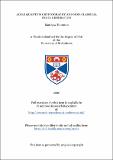Agile quantum cryptography and non-classical state generation
Abstract
In the first half of this Thesis, we introduce a framework of “quantum
cryptographic agility,” which allows for a resource-efficient swap of an
underlying cryptographic protocol. Specifically, we introduce several
schemes which perform the tasks of Digital Signatures and Secret
Sharing. Our first achievement is an investigation of Quantum Digital
Signatures (QDS) over a continuous-variables platform, consisting
of phase-encoded coherent states and heterodyne phase detection.
QDS allows for secure authentication of a classical message, while
guaranteeing message transferability. For the first time, we prove
security of CV QDS in the presence of an eavesdropper on the quantum
channels.
We then introduce a continuous variable (CV) Quantum Secret
Sharing (QSS) protocol. Our security proof allows for classical information
to be split and shared between multiple potentially dishonest
recipients, while retaining security against collective beamsplitter and
entangling-cloner attacks. In the last chapter of this half, we introduce
another QDS scheme which runs over identical hardware setup to
our QSS protocol. We analyse experimental data in which quantum
coherent states were distributed at a rate of 1 GHz, which for QDS
allows us to securely sign a message in less than 0.05 ms.
In the second half of this Thesis we suggest and discuss a deterministic
source of nonclassical light, which we call “PhoG”. Our source is
based on the coherent diffusive photonics, relying on both coherent
and dissipative evolution of the quantum state, and may be realised
in an array of dissipatively-coupled laser-inscribed waveguides in a χ⁽³⁾
glass. We analyse the PhoG device with several analytical and
numerical models and demonstrate that a coherent state input leads
to a bright output state with strong photon-number squeezing. With
minor reconfiguration our system can generate entanglement between
spatially separated modes via a process analogous to four-wave
mixing.
Type
Thesis, PhD Doctor of Philosophy
Collections
Description of related resources
Agile quantum cryptography and non-classical state generation (thesis data) Thornton, M., University of St Andrews, 2020. DOI: https://doi.org/10.17630/6ba10862-4bdd-478f-8bd7-4f4b4d383374Related resources
https://doi.org/10.17630/6ba10862-4bdd-478f-8bd7-4f4b4d383374Items in the St Andrews Research Repository are protected by copyright, with all rights reserved, unless otherwise indicated.

